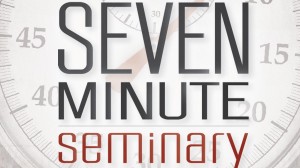
The Biblical Case for Prevenient Grace
Prevenient grace is the work of God’s Spirit on human hearts to loosen sin’s natural grip on us.



Prevenient grace is the work of God’s Spirit on human hearts to loosen sin’s natural grip on us.

Certainly the most-debated verses in all of Romans 8 are these, and here careful attention must be paid not only to what is said, but also what is not said.

What happens to those who never hear the gospel? In today’s Seven Minute Seminary, Dr. Ben Witherington tackles the problem by drawing a parallel to how God will deal with his people Israel at the end of the age, a theme treated in Romans 11.

The parable of the Good Samaritan continues to be one of the most well-known stories of Scripture. There remain, however, treasures to be gleaned by reading it with fresh eyes and from insights of different people groups. In this Seven Minute Seminary video, Dr. Mark Allen Powell shows the surprising results of simply empathizing with an unsuspecting character in the story.
A better understanding of the idea of power can aid us in understanding the love of God in partnership with his sovereignty. Leah Hartman shares what she learned about these dynamics in the context of her relationship with the man who would later become her husband.

What is the strongest answer Wesleyan Arminianism has for 5-Point Calvinism? David Hatton explains his journey of understanding both doctrinal stances and calls for a better understanding of our strongest argument: Prevenient Grace.

What happens to those who have never heard the gospel? In today’s article, Brian Shelton, a new expert on the scriptural basis for prevenient grace, explores how this Wesleyan theological theme might make a difference in the destiny of the unevangelized.

The great flood we find in the story of Noah was bad news for most people. But when read attentively and against its ancient background, the story of Noah and the great flood turns out to be good news in a surprising way. Read more today from Bible teacher Brian Russell.

Did God love the Egyptians when he struck Egypt with plagues? In the larger biblical narrative, the answer is obviously yes. But when reading the Exodus story, its difficult to come to terms with. In this article, Craig Keener explains how and why God loved the Egyptians.

Brian Shelton realized that gaining clarity when it comes to predestination and free will is to be found not in the synthesis of these two doctrines, but in their separation. Read about his journey into exploring the biblical foundation for prevenient grace.

What does election have to do with salvation? In this video, Ben Witherington reminds us that the two are not the same thing. While in the Old Testament election was considered “in Israel,” in the New Testament it is for those “in Christ.” This means that it’s always a corporate matter, not about which individuals are saved and which ones are not.

Does Romans 9-11 teach Calvinist predestination? In this Seven Minute Seminary, Ben Witherington explains that Paul’s aim is to refute the idea that God now favored the Romans, or Gentiles, rather than the Jews. In the process, he explains how the terms predestination, election, and salvation relate—or don’t relate—to one another.